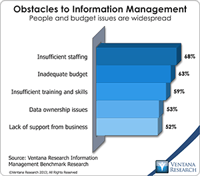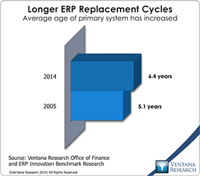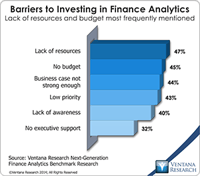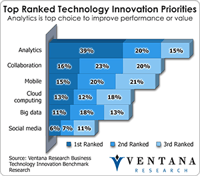SYSPRO is a 35-year-old software vendor that focuses on selling enterprise resource planning (ERP) systems to midsize companies, particularly those in manufacturing and distribution. In manufacturing, SYSPRO supports make, configure and assemble, engineer to order, make to stock and job shop environments. The company attempts to differentiate itself through vertical specialization and its years of ongoing development, which can reduce the need for customization and cut the cost of initial and...
Read More
Topics:
Big Data,
SaaS,
ERP,
Governance,
Human Capital Management,
Office of Finance,
close,
Continuous Accounting,
Analytics,
CIO,
Cloud Computing,
Collaboration,
CFO,
CRM,
CEO
When applying information technology to drive better business performance, companies and the systems integrators that assist them often underestimate the importance of organizing data management around processes. For example, companies that do not execute their quote-to-cash cycle as an end-to-end process often experience a related set of issues in their sales, marketing, operations, accounting and finance functions that stem from entering the same data into multiple systems. The inability to...
Read More
Topics:
Big Data,
Mobile,
ERP,
Office of Finance,
Operational Performance Management (OPM),
Operations,
Management,
close,
closing,
computing,
end-to-end,
Analytics,
Cloud Computing,
Data Management,
Business Performance Management (BPM),
CRM,
Data,
finance,
Information Applications (IA),
Information Management (IM),
Sales Performance Management (SPM),
Supply Chain Performance Management (SCPM),
FPM
Like other vendors of cloud-based ERP software, NetSuite offers the key benefits of software as a service (SaaS): a smaller upfront investment, faster time to value and potentially lower operating costs. Beyond that NetSuite’s essential point of competitive differentiation from is broad functionality beyond financial management, including capabilities for customer relationship management (CRM), professional services automation (PSA) and human capital management (HCM). These components make it...
Read More
Topics:
Microsoft,
Mobile,
SaaS,
Sales,
Customer Experience,
ERP,
HCM,
Human Capital,
Office of Finance,
Operational Performance Management (OPM),
communications,
Dynamics AX,
Dynamics GP,
Dynamics NAV Dynamics SL,
PSA,
Sage Software,
UI,
Unit4,
Analytics,
Business Analytics,
Cloud Computing,
Business Performance Management (BPM),
CFO,
CRM,
Customer Performance Management (CPM),
Financial Performance Management (FPM),
FinancialForce,
HR,
Infor,
Sales Performance Management (SPM),
Supply Chain Performance Management (SCPM),
Workforce Performance Management (WPM),
Social,
Financial Performance Management,
FPM,
Plex,
Professional Services Automation,
Workday Collaboration
When it comes to making a business case for software investments, many people fail to recognize that the case itself is just one part of what amounts to an internal sales and marketing effort that they must perform well to be successful. Focusing only on the numbers and assumptions in a spreadsheet is not enough. Making a successful business case requires an understanding of the audience’s perspective and motivations. Since the individuals who will review the business case may not be...
Read More
Topics:
Planning,
ERP,
Office of Finance,
Operational Performance Management (OPM),
Research,
budgeting and planning,
ROI,
Analytics,
Business Performance Management (BPM),
CFO,
CRM,
Customer Performance Management (CPM),
Financial Performance Management (FPM),
Sales Performance Management (SPM),
Supply Chain Performance Management (SCPM),
business plan,
capital spending,
Financial Performance Management,
FPM,
SCM,
Software
Finance departments don’t immediately come to mind in conversations about social collaboration technology. Most of the software used for social collaboration that I’ve seen demonstrated focuses on the sales process or for broader employee engagement. The Facebook-style interface may cause finance department managers and executives to roll their eyes, especially if they’re over 40 years old. Yet business and social collaboration is an important set of capabilities that has been taking hold in...
Read More
Topics:
Customer Experience,
ERP,
Operational Performance Management (OPM),
communications,
Business Collaboration,
Cloud Computing,
Collaboration,
Business Performance Management (BPM),
CRM,
Financial Performance Management (FPM),
Workforce Performance Management (WPM),
Social,
FPM
Read More
Topics:
Mobile,
Predictive Analytics,
Real-time,
SAP,
ERP,
Operational Performance Management (OPM),
Analytics,
Business Analytics,
Business Collaboration,
Cloud Computing,
In-memory,
Business Performance Management (BPM),
CRM,
Customer Performance Management (CPM),
finance,
Financial Performance Management (FPM),
Sales Performance Management (SPM),
Supply Chain Performance Management (SCPM),
Workforce Performance Management (WPM),
Social,
Business Suite,
Financial Performance Management,
HANA
It’s clear that certain customers generate more profits than others, just as some products offer greater economic returns than others, as I’ve noted before. For this reason, efforts to improve customer profitability are not a new trend. Good managers have always looked for ways to achieve the highest sustainable margins. However, at some point, almost all businesses realize that increasing sustainable profitability can’t be achieved simply through increasing revenue or cutting costs. Those...
Read More
Topics:
Office of Finance,
Operational Performance Management (OPM),
Analytics,
Business Analytics,
Business Intelligence,
Business Performance Management (BPM),
CRM,
Customer Performance Management (CPM),
Financial Performance Management (FPM),
Information Applications (IA),
Sales Performance Management (SPM),
Financial Performance Management,
Profitability
SAP is planning to acquire e-commerce company Ariba in a transaction worth about US$4.3 billion expected to close in the third quarter of this year. Ariba provides cloud-based collaborative business commerce through a Web-based trading community that enables companies to find, connect and collaborate with a global network of partners. Its Commerce Cloud is a platform that businesses can use to buy and sell goods. Currently, Ariba counts more than 700,000 companies worldwide attached to this...
Read More
Topics:
Big Data,
SAP,
ERP,
EDI,
end-to-end,
Analytics,
Cloud Computing,
Uncategorized,
CRM,
SCM
Infor described this year’s Inforum user group meeting as a coming-out party for a large startup company. Such a debut was necessary because Infor had been operating in something of a stealth mode for the past three years: a limited marketing presence, no unified message and a weak, sometimes inconsistent brand identity. It also needed to formally introduce Infor to customers of Lawson, the ERP supplier it acquired last year. The “startup” designation is meant to signal that Infor has been able...
Read More
Topics:
Performance Management,
Salesforce.com,
SAP,
Social Media,
Sustainability,
ERP,
Human Capital Management,
Marketing,
Operational Performance Management (OPM),
Epiphany,
expense management,
Lawson,
Business Analytics,
Business Collaboration,
Business Intelligence,
Business Mobility,
Cloud Computing,
Governance, Risk & Compliance (GRC),
IBM,
Operational Intelligence,
Oracle,
CRM,
Customer Performance Management (CPM),
finance,
Financial Performance Management (FPM),
Infor,
Information Applications (IA),
Information Management (IM),
IT Performance Management (ITPM),
Sales Performance Management (SPM),
Supply Chain,
Supply Chain Performance Management (SCPM),
Workforce Performance Management (WPM),
Financial Performance Management
I recently received an update from ERP software vendor Epicor, my first since it was acquired in May 2011 by Apax Partners, a private equity company, and simultaneously merged with Activant, an ERP and point-of-sale software company serving midsize retailers and distributors. In my view, taking the company private is a good idea since it will have to make ongoing investments that would not have been treated kindly by the stock market. Bringing Epicor and Activant together (and perhaps adding...
Read More
Topics:
Big Data,
Microsoft,
Mobile,
SAP,
Social Media,
ERP,
Operational Performance Management (OPM),
Dynamics,
Epicor,
Sage,
Analytics,
Business Analytics,
Business Collaboration,
Business Mobility,
Cloud Computing,
Oracle,
Business Performance Management (BPM),
CRM,
Financial Performance Management (FPM),
Infor,
Supply Chain Performance Management (SCPM),
Workforce Performance Management (WPM),
Social,
Financial Performance Management















